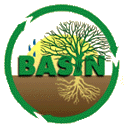
Mark Losleben - CU INSTAAR Research Staff
 |
|
Mark Losleben - CU INSTAAR Research Staff |
The following snowpack conditions on Niwot Ridge have been reported by Mark Losleben for February, 2003. Select here for more information about these snowpack reports
Finally, a snowy February blessed us, after a (too) long dry spell, this year! At C1, Niwot Ridge, we recieved 44.9 inches of snowfall, and 3.17" SWE (snow water equivalent), and have a snowpack 38.5" deep with a SWE content of 8.5", as of 27 February 2003 (manual measurements). The SWE content is 81% of average, which is a hefty increase over a month ago when it was a mere 60%, showing nearly a 1%/day increase!
Note that February is a much easier month to catch up than March, on a percentage basis, because it is normally much drier than March. (In other words, an additional inch of SWE has a much greater impact on the average in February than it does in March).
According to the SnoTel network, the Niwot snowpack agrees well with the manual measurement, 81% of average. The cummulative winter precipitation to date is 94%, meaning we are still behind in what we might nomrally expect in the snowpack given how much precipitation has fallen this winter. This is also true for the South Platte basin as a whole (81% SWE and 89% precipitation), but is not true for many of the basins in the state, for a change.
The Yampa/White and Upper Colorado basins have the top snowpack SWE percentages, 90%, but the Yampa/White has recieved 92% of their average precipitation this season, and the Upper Colorado a little less, 88%, as of 27 February. The San Miguel/Dolores/Animas/San Juan area has the least snowpack, at 72% (79% precipitation), and the Upper Rio Grande is close, with 73% SWE and 78% precipitation. Both of these are a great improvement over last month when they were 64% and 58%, respectively.
So, the southwest corner of the state contiues to be the driest area, and the nothern areas wettest, but all parts have increased their snowpack compared to average, in February. Many folks are predicting an above average snowfall in March, so the future is looking more promising than it has any time last year.
For a little broader perspective, snowpack SWE conditions over the full western US show a mixed El Nino pattern. Consistent with this pattern, the northwest Pacific regions are dry (the Coast Range of Oregon has 0% of its snowpack right now), but the southwestern regions which should be wet, are also drier than normal (Arizona snowpacks range between 35 and 70%). Colorado actually has one of the healtier snowpacks compared to the other western states. Some SWE ranges for other states:
Northern NM is actually doing quite well, with four basins over 100%, but the southern part of the state is dry (Gila basin has 55%).
Alaska is interesting because its snowpack is a low 35-72% but its winter precipitation is 105-138%, a very clear indication that warmth (and other factors) are hindering snowack formation there.
In summary, February was a good month for Colorado, and the March outlook is favorable for a continued recovery. The manual historical snowpack record follows.
Snow Water Content (inches)
Values are for the end of given month
except as noted for May and June
Season Dec Jan Feb Mar Apr May
81/82 4.75 10.5 11.75 15.5 14.9 12.0 (17th)
82/83 3.63 4.75 12.75 17 11.75 (30th)
83/84 12.6 13.25 15 18.9 20.75
84/85 3.75 6.25 8.5 10.25 8.75
85/86 6.5 7.5 14 15.38 17.5
86/87 6.25 8.75 11.25 12.75 11.75
87/88 6.5 9.1 12.4 15.75 14.5
88/89 5.5 7.6 11 10.25 5.6
89/90 6.5 9.25 10.75 16.1 16.5
90/91 3 5 7.1 9.38 10
91/92 6.65 6.75 8.5 12.25 10.25
92/93 5.75 6.75 10.75 14 15.875
93/94 7.125 9.063 12.25 13.25 13.25 2.5 (18th)
94/95 2.625 3.925 7.0 10.125 16.75 17.0 (22nd)
19.75 (30th)
95/96 7.50 12.00 17.5 20.375 18.75 6.125 (15th)
96/97 8.75 12.625 15.125 14.625 20.375 18.0 (15th)
97/98 7.0625 10.0 10.125 12.875 17.25 12.875 (15th)
98/99 3.25 6.625 8.375 9.125 14.125 14.25 (15th)
99/2000 3.5 7.5 10.625 12.375 7.625
00/2001 4.375 5.375 7.125 10.00 9.125
01/2002 2.625 4.25 6.19 7.563 0.0
02/2003 4.00 5.25 8.5
Average 5.554 7.967 10.389 13.027 13.363
Please pardon the major omission in yesterdays C1 snowpack report. I did not give last years figures for comparison, so here they are:
Feb 2002 Feb 2003
Niwot (manual) 58% 81%
(SnoTel) 53% 81%
S. Platte basin 57% 81%
State Maximum 68% 90% Upper Colorado basin both years
State Minimum 42% 72% San Miguel/Animas/Dolores/San Juan both years